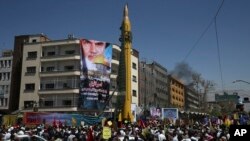The United States slapped sanctions Tuesday on 18 Iranian individuals and groups it accused of backing Tehran's ballistic missile program, even after the U.S. recertified Iranian compliance with the 2015 nuclear deal.
The State Department said Iranian activities across the Middle East "undermine regional stability, security, and prosperity."
The State Department sanctioned two groups linked to Iran's elite Revolutionary Guards, saying they were involved in ballistic missile research and development and test flights.
The Treasury Department also sanctioned seven entities and five individuals for their support of Iranian military purchases, plus what it described as an "Iran-based transnational criminal organization" and three people linked to the group.
The sanctions freeze any assets the targeted Iranians might have in the U.S. and block Americans from doing business with them.
'Bad habit'
At the United Nations in New York, Iranian Foreign Minister Mohammad Zarif told VOA's Margaret Besheer that sanctions had "unfortunately become a bad habit" with the U.S.
He also said the U.S. could expect reprisals.
"It will involve people who have participated in terrorism and extremism in our region as well as supporting expansionism," Zarif said, telling Besheer an announcement on retaliatory sanctions on the U.S. would come "in due course."
Also Tuesday, the U.S. renewed its demand that Iran free three Americans held on what the U.S. called "fabricated national-security-related charges." It also insisted Iran keep its promise to free former FBI Agent Robert Levinson, who has been missing in Iran for more than a decade.
The U.S. announced the new sanctions just a day after it recertified Iranian compliance with the nuclear agreement that Tehran signed in 2015 with the U.S. and five other world powers.
The deal requires Iran to limit its ability to enrich uranium, which can be used to build a nuclear bomb, in exchange for trade and sanctions relief.
During the presidential campaign, then-candidate Donald Trump excoriated the Obama administration for signing what Trump called "the worst deal ever negotiated."
U.S. news reports said the president only reluctantly agreed to recertify Iranian compliance.
The United States has said Iranian military advances in the Mideast and alliances with insurgent groups in the region "are serving to undercut whatever positive contributions to regional and international peace and security were intended to emerge" from the nuclear pact.
Iranian funding
The Iranian parliament voted overwhelmingly Tuesday for $520 million in new funding for the country's missile program and the Revolutionary Guards' foreign operations wing, the Quds Force, to combat what it said was Washington's "adventurism" in the Middle East.
A senior Trump administration official said that while Iran was technically meeting the terms of the nuclear deal, it was "unquestionably in default of the spirit of the agreement," adding that the Trump administration was working with its allies to more strictly enforce the deal going forward.
The senior official told reporters the White House thought Iran remained one of the most dangerous governments in the world, citing what it said was Tehran's support for terrorism, continuing hostility to Israel, cyberattacks against the United States and numerous human rights abuses.
White House officials emphasized that the administration's stance toward the nuclear deal remained under review.
"The president has made very clear his desire to fix the many flaws in the deal. ... His commitment to fixing those flaws remains steadfast," one senior official said.
VOA's Margaret Besheer contributed to this report.






